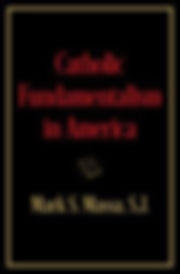Catholic Fundamentalism in America
- Profiles in Catholicism
- Jun 14, 2025
- 1 min read
by Mark Massa, S.J.
Reviewed by Daniel Brown

Historically, fundamentalism refers to the 20th century American Protestant phenomenon connected with a literalist reading of the bible and opposing historical and literary criticism. Ever since The Fundamentalism Project by Martin Marty and R. Scott Appleby the term’s wider usage has been generally accepted to apply to similar, very conservative movements in many religions. Massa studies several twentieth and twenty first century people and movements with roots in American Catholicism that share the features of fundamentalism. They are (1) sectarian, (2) adherents of an older paradigm at odds with the prevailing theology, (3) ahistorical, (4) use political terminology of liberal/conservative divisions, and (5) they are militant. Ironically the Catholic fundamentalists adopt a Protestant principle by retreating from one of the most important features of Catholicism, namely communio, the connection with other believers—however sinful--in unity with the universal church. Radical Catholics of the left and right have disagreed--and continue to disagree--with each other for centuries without breaking unity with other Catholics. Most of the fundamentalists described here object to the Second Vatican Council and the subsequent reforms. They feel that they are the authentic Catholics unlike all those others, even if they are bishops or even popes.
